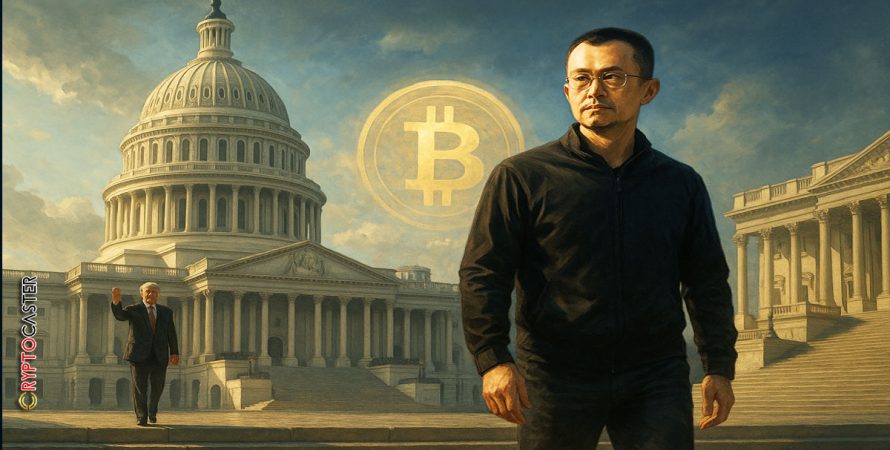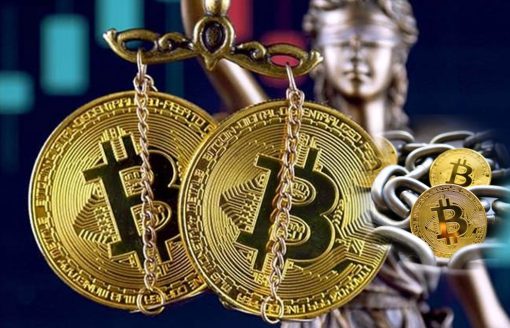By Intelligence Desk | Cryptocaster
President Donald Trump’s decision to pardon Changpeng “CZ” Zhao, the founder and former CEO of Binance, marks a dramatic inflection point in Washington’s stance toward digital assets. The October 23 pardon—issued less than a year after Zhao completed his sentence for anti-money-laundering violations—has sent shockwaves through both regulatory circles and the global crypto market.
Stay in the know on crypto by frequently visiting Crypto News Today
From Conviction to Clemency
Zhao pleaded guilty in late 2023 to charges under the Bank Secrecy Act for failing to implement effective anti-money-laundering protocols at Binance, the world’s largest cryptocurrency exchange. The case culminated in a record-setting $4.3 billion settlement between Binance and U.S. authorities, and a four-month prison term for Zhao. At the time, the Department of Justice framed the case as a turning point in its campaign to hold crypto executives accountable for compliance failures.
CryptoCaster Quick Check:
Now, less than two years later, the White House has reversed course. In a statement, press secretary Karoline Leavitt said the president’s action “ends the prior administration’s war on crypto and restores America’s commitment to blockchain innovation.” The pardon, she added, “reflects a forward-looking strategy to re-establish the United States as the global capital of digital finance.”
Policy Reversal or Political Signal?
Observers are divided over whether Trump’s move represents principled deregulation or calculated political messaging. Crypto lobbying in Washington has intensified in recent months, and industry leaders have applauded what they call a “return to rationality.” Binance issued a statement within hours of the announcement, calling the pardon “a defining moment for the future of global digital markets” and promising expanded U.S. operations.
Critics, however, warn that the decision undermines years of regulatory progress. Former SEC officials argue that pardoning Zhao risks legitimizing the compliance lapses that allowed Binance to operate for years outside standard U.S. oversight. “It sends the wrong message,” said one former Treasury official. “You can’t rebuild credibility in the crypto space by erasing accountability.”
Intersecting Interests
The pardon also reopens questions about potential conflicts of interest between Trump’s political network and Zhao’s ventures. Earlier this year, reports surfaced that Binance had provided technical support to World Liberty Financial—a crypto firm linked to members of the Trump family—just months before Zhao’s clemency request. The White House has not addressed those connections directly, but ethics experts suggest that the optics could cloud what might otherwise be seen as a pro-innovation gesture.
Industry Implications
Market response was immediate. Bitcoin held steady above $110,000—continuing a year-long trend of six-figure stability—while Binance’s BNB token and several exchange-related assets posted strong intraday gains. Analysts interpret the move as confirmation that U.S. enforcement against exchanges and DeFi platforms will likely soften under the Trump administration.
For institutional players, the shift could pave the way for renewed investment in blockchain infrastructure, stablecoin initiatives, and digital-asset custody services—areas that had stagnated amid the regulatory chill of 2023–2024. “The message from Washington appears to be: the door is open again,” said one venture fund manager focused on tokenized markets.
The Broader Arc
The pardon of CZ is more than an act of clemency—it’s a political statement. It underscores the Trump administration’s intent to reposition the United States as the epicenter of crypto innovation, even at the expense of prior enforcement credibility.
Whether that gamble yields stability or renewed volatility will depend on how quickly regulators, lawmakers, and industry leaders can define new guardrails for a sector still struggling to reconcile freedom with oversight.
In effect, the White House just signaled that the next chapter of America’s crypto era will be written not by regulators—but by markets.
If this article brought you clarity, insight, or value—support the work that made it possible.
At CryptoCaster, we report on Web3, crypto markets, and institutional finance with no billionaire owners, no shareholders, and no hidden agenda. While mainstream media bends toward Elon Musk, BlackRock, and JPMorgan narratives, we stay focused on what matters: truth, transparency, and the public interest.
We don’t just cover the headlines—we investigate the power structures behind them. From FTX and Ripple to the quiet push for CBDCs, we bring fearless reporting that isn’t filtered by corporate interests.
CryptoCaster is 100% paywall-free. Always has been. To keep it that way, we depend on readers like you.
If you believe independent crypto journalism matters, please contribute—starting at just $1 in Bitcoin or Ether. Wallet addresses are below.
Your support keeps us free, bold, and accountable to no one but you.
Thank you,
Kristin Steinbeck
Editor, CryptoCaster
Support CryptoCaster: The Unfolding of Money
At CryptoCaster.world, we’re dedicated to bold journalism, sharp insights, and fearless commentary across blockchain, Web3, and crypto markets. Your **Bitcoin contributions** help us stay independent and continue delivering signal over noise.
🚨 CryptoCaster does not offer investment advice. Always DYOR—volatility is real, and risk tolerance matters.
Support our mission. Contribute BTC today.
🔗 Bitcoin Address:
3NM7AAdxxaJ7jUhZ2nyfgcheWkrquvCzRm
Thank you for backing our journalistic lens as we chronicle the Unfolding of Money — a saga still being written in real time.![]()
CRYPTOCASTER HEATMAP








